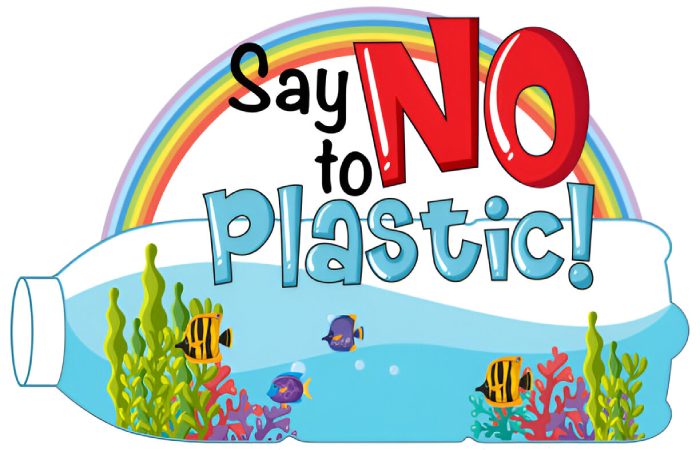Say No To Plastic Poster – Plastic is everywhere today, from the wrappings around food to the products we use daily. Plastic has become part of modern life; however, its abuse has brought significant environmental problems. The “Say No to Plastic Poster” call has become a global movement against these problems. The message is, therefore, apparent: we have to reduce the consumption of plastics for our health, wildlife, and future lives. This article explores the need to say no to plastic posters by describing how we can reduce our plastic footprint.
The Plastic Problem: Environmental and Ecological Impact
Where plastic was once hailed as a miracle material because of its durability, versatility, and lower cost, it’s become one of the most pressing environmental challenges of our time. Each year, millions of tons of plastic waste end up in the oceans, causing harm to marine life and disrupting these ecosystems. By 2050, there will likely be more plastic than fish in the oceans by weight, according to a study conducted by the Ellen MacArthur Foundation.”.
The damages attributed to plastic do include a wide range of environmental damage. Plastics take hundreds of years to decompose and then into micro-plastics that is found in the oceans, rivers, soil, and even the air we breathe. These microplastics have entered into the food chain and threaten seriously human health and biodiversity. In this regard, the sea turtles, seabirds, they actually mistake for food plastics and end up ingesting, suffocating, or getting entangled in them.
The Impact on Wildlife
Plastic waste has a direct effect on wildlife, especially in oceans. Already, more than 700 species, which include whales, dolphins, and sea birds, have been affected by plastic pollution. Birds swallow tiny pieces of plastic, thinking it is food, which brings malnutrition, poisoning, and death. Similarly, plastic waste may entangle marine mammals and fish, resulting in injuries or drowning.
As if that were not enough, coral reefs, one of the most biodiverse ecosystems on the planet, are also suffering from plastic pollution. Large amounts of plastic debris can smother corals, blocking sunlight and disrupting the delicate balance of the reef system. In turn, this affects the entire marine food web.
Plastic and Climate Change
Apart from the negative environmental impact, plastic itself contributes to global warming. The plastics obtained are from fossil fuels, mainly petroleum and natural gas. Extraction, refining, and manufacturing of plastics release large amounts of greenhouse gases into the atmosphere. Reducing plastic means reducing our use of fossil fuels, reducing our carbon footprint, and diminishing the impacts of global warming.
Saying No to Plastic: Simple Steps to Make a Difference
All is not lost if you want to do your part in reducing plastic waste. Saying no to plastic doesn’t necessarily mean altering your way of life. Just a few mindful adjustments can make a big difference. Here are some easy ways to reduce the amount of plastic we consume:

Reduce, Reuse, Recycle
A good starting point would be the three Rs. Reduce the plastics we use in the first place. So, start looking for products with minimal packaging and choose reusable items over those made of single-use plastic alternatives. Carry a reusable bottle, shopping bag, and coffee cup to avoid plastic bottles, bags, and lids.
Support Plastic-Free Alternatives
Today, many companies offer alternatives to everyday goods in plastic-free options, such as biodegradable toothbrushes or even food containers made of glass or metal. You can further reduce your reliance on plastic while promoting businesses that prioritize sustainability.
Participate in Clean-Up Efforts
Volunteer to participate in beach clean-ups or any local initiative toward the environment. Aside from beautifying surroundings, plastic waste thrown around public places, would also prevent it from entering natural ecosystems.
Advocate for Change
Once governments, industries, and businesses assume responsibility for tackling plastic waste, there is also a need to support policies and initiatives that encourage sustainable practices, such as banning single-use plastics, promoting recycling programs, or investing in alternative materials. Grassroots pressure might create big ripples and policies: think about how countries finally ban plastic bags.
Educate Yourself and Others
Staying alert to environmental issues relating to plastic waste is essential. The more people know, the more they will probably make informed decisions. Please share your knowledge with friends and family members and keep them motivated.
The Role of Plastic-Free Movements
Communities and organizations worldwide are laboring hard to mitigate plastic pollution. The “Say No to Plastic” movement is growing, with initiatives such as Plastic Free July, calling individuals to forgo plastic usage for a month, and plastic-free certification for businesses. Countries such as the UK, Canada, and several others in the EU have enforced policies to ban or restrict single-use plastics to demonstrate the extent of power associated with collective action.
Conclusion
Refusing plastic is no longer a slogan but a necessary action for securing the future of our planet for succeeding generations. Decreased plastic waste is bound to protect wildlife, preserve natural resources, and mitigate climate change. Every little change we make, rejecting a plastic straw or opting for a more sustainable product, makes a difference. So, let’s make a difference by reducing plastic posters and creating a healthier world for all.
Also Read:
Chocolate Cake Designs for Birthdays: A Sweet Touch
Plain Gold Ring Design for Female
Mehndi Design Easy And Beautiful Back Hand

